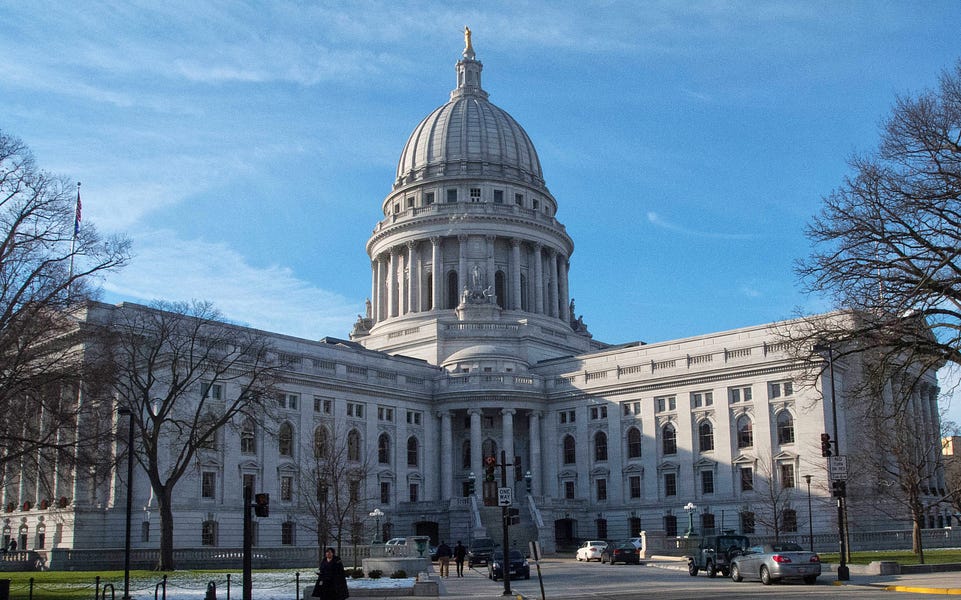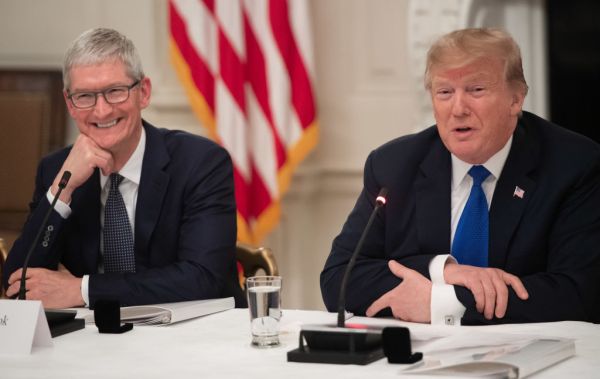Donald Trump’s loss in Wisconsin on Tuesday might create the impression that the state GOP is, to borrow a phrase from The Princess Bride, “mostly dead.”
But Trump’s performance obscures the fact that Wisconsin Republican candidates had a strong night, with the GOP picking up two seats in the State Senate and losing only two seats from a bloated majority in the State Assembly despite the fact Democrats more than doubled GOP fundraising efforts. Pre-election polling had suggested the Assembly losses could be much deeper. The final vote leaves Republicans with a 21-12 majority in the Senate and a 61-38 majority in the Assembly.
Trump lost in part because he saw support fade in the state’s largest GOP-friendly counties. In each one of the three suburban Milwaukee “WOW” counties—Waukesha, Ozaukee, and Washington—Trump’s margin over Biden was smaller than it was over Hillary Clinton in 2016. Had Trump merely won the WOW counties in 2020 by the same proportions he won them in 2016, he would have narrowly overcome Biden’s final lead of around 20,500 votes.
In heavily Republican Waukesha County, where 268,000 votes were cast, Trump’s margin of victory shrunk by 5.7 percentage points over 2016—in smaller counties Ozaukee and Washington, that erosion was 6.8 points and 2.1 points, respectively.
Conversely, at the state level, Republicans were able to withstand an onslaught of spending from Democrats aided, in large part, by fundraisers featuring national celebrities reuniting with former castmates to do live-reads of well-loved movies and television shows. These included casts from the Princess Bride, Parks and Recreation, and Happy Days.
Princess Buttercup, Leslie Knope, and The Fonz helped the Democratic party of Wisconsin raise nearly $59 million during the current election cycle, dwarfing the $24 million raised by state Republicans. This cash influx helped liberal groups spend $800,000 in hopes of unseating Assembly Speaker Robin Vos, but Vos won by 16 percentage points on Tuesday.
Vos had been the Wisconsin Democrats’ primary foe for years, and they considered unseating him to be the ultimate trophy. On Election Day, Planned Parenthood of Wisconsin even flew a plane over the district urging residents to oust him.
Vos credited “strong incumbents” and “great recruits” for his caucus’ stronger-than-expected showing, telling The Dispatch “an aggressive ground game always wins in Wisconsin.”
“Democrats spent months as keyboard warriors and calling people on the phone like a bunch of telemarketers,” Vos said, adding, “they were flooded with cash and thought they could buy the election with negative ads against us. Glad the voters reminded them that shoeleather beats digital every time,” he said.
The strong showing by legislative Republicans was even more surprising given their supposed unpopularity among the public. The last Marquette University Law School poll taken before the election suggested only 36 percent of Wisconsin residents approved of the way the legislature had been handling its job, 11 points below even Donald Trump’s job approval rating. (The same poll also had Biden winning the state by 5 percentage points.)
The legislature’s approval rating has sunk 16 points in the past year, as its efforts to fight COVID-19 measures implemented via executive order by Democratic Gov. Tony Evers were often out of touch with public sentiment. One example is his statewide mask order, which was supported by 72 percent of Wisconsinites, according to the Marquette Law poll.
Nonetheless, Republicans, aided by maps drawn by GOP legislative majorities nearly a decade ago, demonstrated strength across the state. In Southeast Wisconsin, voters elected the first African-American Republican state senator, and in Green Bay, the GOP took a Senate seat held by Democrats for two decades. But diving deeper on the demographics raises questions about whether state-level Republicans outperformed Trump or whether the president’s failure is a “leading indicator” that portends trouble for the GOP down the road.
In a sense, the Wisconsin vote reflected the national electoral returns: Voters appeared to be down on Trump but still willing to trust legislative Republicans. In Congress, the GOP picked up a handful of seats and Georgia may soon be hosting a pair of runoff elections that could allow Republicans to retain the Senate.
University of Wisconsin-Madison political science professor Barry Burden noted that even in 2016, Trump ran well behind Republican U.S. Senator Ron Johnson in the state, especially in the WOW counties.
“An important question for future elections is to what degree the WOW suburbs remain supportive of Republican candidates,” said Burden. “Republican support in suburbs across the country has softened over the past four years, but the communities around Milwaukee actually appeared to be holding better for the GOP than those around cities such as Milwaukee and Philadelphia.”
“More traditional candidates such as Ron Johnson and Scott Walker will still run exceptionally well in suburbs, but the future of the Republican party in Wisconsin now leans more heavily on rural communities than it did in the pre-Trump era,” Burden said.
Wisconsin-based Democratic consultant Joe Zepecki agreed.
“As fired up as the president’s conduct and campaign got the GOP base in smaller, rural communities, the suburbs that represented the beating heart of the conservative movement and Republican party in Wisconsin for most of the last decade didn’t deliver for him,” said Zepecki. “Polling may have missed in a lot of respects, but the vote suggests that suburban skepticism of Trumpism was not only real and enduring, but grew worse for the president over the course of the last four years.”
If Republicans can’t wrestle the suburbs back away from their Trump-induced lethargy, it could spell doom for statewide Republicans in the future.
Indeed, since Trump was elected in 2016, Democrats have won nine of 10 statewide races in Wisconsin, including two nonpartisan Supreme Court races in which candidates were backed by political parties. (The only win for Republicans in the group was a Supreme Court race in which conservative Judge Brian Hagedorn beat a Democratic-backed challenger.)
That run of Democratic success means that even with Republicans’ strong night in 2020, they will still have to work with Evers. “Our state is and always has been a very contested, bipartisan state so we work together to get what we can get accomplished,” Evers told reporters Wednesday.
And what do Republicans need to do to bring the suburbs back into the fold?
“The recipe for success in the future is going to be candidates with policy ideas that can once again unite the rural-suburban coalition and also find new sources of support,” said Wisconsin-based Republican Strategist Brian Reisinger.
“One promising area is some of the exurban areas—smaller communities and more middle class neighborhoods than classic ‘suburbs’—where the vote count remained strong or got stronger. That’s something President Trump has brought to the table, and the GOP needs more such sources of new voters,” said Reisinger, adding that the only answer is “policy ideas that will unite current GOP voters and new voters.”
Reisinger suggested uniting the Republican party will be an easy task compared to that of the Democrats, who need to unite the radical ideas of activists in places like Madison with “people who live literally anywhere else.”
But as the vote stands, Trump has lost Wisconsin, even though he has announced plans to move ahead with a recount effort that has very little chance of changing the outcome. Or as one Democratic political insider put it to me, “Maybe I will work the recount and get paid by Trump to see him lose a second time.”
Photograph by Universal Images Group/Getty Images.







Please note that we at The Dispatch hold ourselves, our work, and our commenters to a higher standard than other places on the internet. We welcome comments that foster genuine debate or discussion—including comments critical of us or our work—but responses that include ad hominem attacks on fellow Dispatch members or are intended to stoke fear and anger may be moderated.
With your membership, you only have the ability to comment on The Morning Dispatch articles. Consider upgrading to join the conversation everywhere.